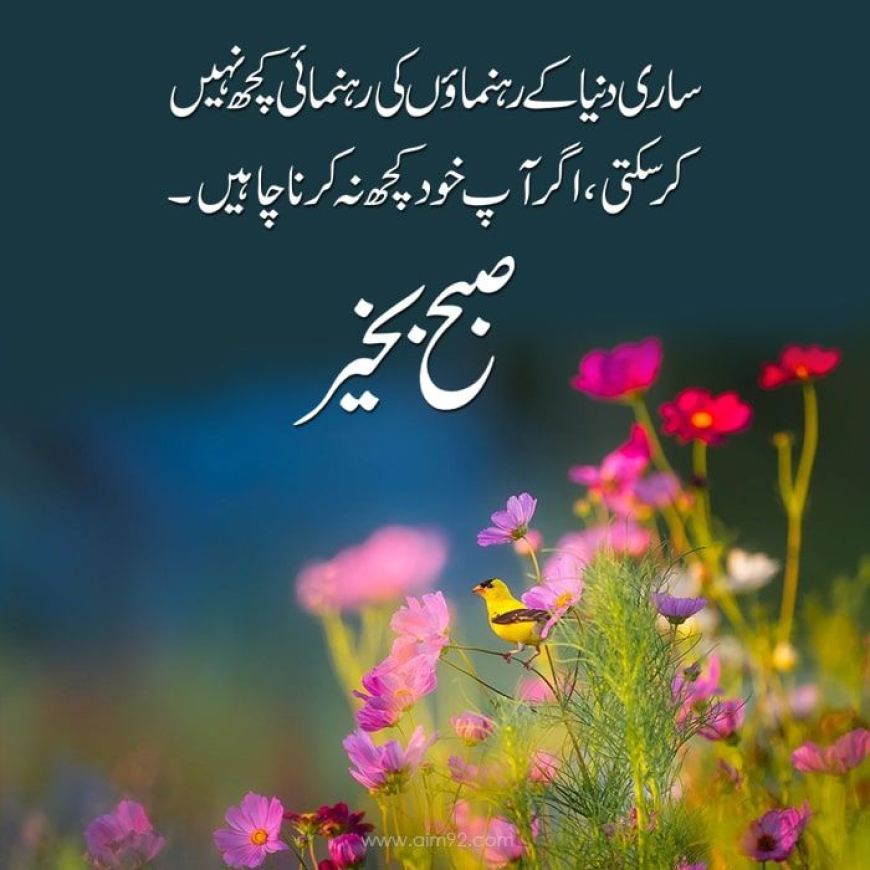Good Morning Wishes in Urdu: A Heartfelt Guide to Spreading Positivity
Good Morning Wishes in Urdu

Starting the day with a warm greeting can set the tone for positivity and connection. In the rich tapestry of the Urdu language, "Good Morning" wishes, or "صبح بخیر" (Subah Bakhair), carry profound cultural significance. This article delves into the art of expressing morning greetings in Urdu, offering a blend of traditional phrases, poetic expressions, and modern adaptations to help you convey your sentiments effectively.
Understanding the Essence of "Subah Bakhair"
"Subah Bakhair" is the most traditional and widely used way to say "Good Morning" in Urdu. It is typically used in formal settings and is appropriate when addressing someone older or in a position of authority.
Formal and Respectful Greetings
In professional or formal settings, it's essential to use greetings that reflect respect and politeness. Here are some expressions to consider:
-
صبح بخیر (Subah Bakhair): The standard "Good Morning" greeting.
-
دن کی شروعات مبارک ہو (Din Ki Shuruat Mubarak Ho): "Have a blessed start to the day."
-
خوبصورت صبح (Khubsurat Subah): "Beautiful Morning."
These phrases not only convey your wishes but also demonstrate cultural awareness and respect.
Informal and Affectionate Expressions
For friends, family, or close colleagues, a more casual approach can be heartwarming:
-
صبح بخیر جان (Subah Bakhair Jaan): "Good morning, dear."
-
صبح بخیر دوست (Subah Bakhair Dost): "Good morning, friend."
-
صبح بخیر خوبصورت (Subah Bakhair Khoobsurat): "Good morning, beautiful."
These informal greetings add a personal touch, making the recipient feel cherished.
Regional Variations Across the Urdu-Speaking World
Urdu is spoken across various regions, each adding its unique flavor to greetings:
-
Karachi Region: "صبح جو اچھی ہو" (Sabah Jo Achi Ho) – "May your morning be good."
-
Lahore Region: "صبح نور کی بارش ہو" (Subah Noor Ki Barish Ho) – "May your morning be filled with light."
-
Peshawar Region: "صبح خوشحال پخیر راغلے" (Subah Khushhaal Pakhair Raghley) – "May your morning be prosperous."
These regional variations reflect the diverse cultural nuances within the Urdu-speaking community.
Poetic and Inspirational Morning Wishes
Urdu literature is renowned for its poetic expressions. Incorporating poetry into your morning greetings can add depth and emotion:
-
"صبح کا ہر پل زندگی دے آپکو، دن کا ہر لمحہ خوشی دے آپکو"
"Subah Ka Har Pal Zindagi De Aapko, Din Ka Har Lamha Khushi De Aapko"
Translation: "May every moment of your morning give you life, and every moment of your day bring you happiness."
-
"خوابوں کی وادیوں میں ہو شہر آپکا، ستاروں کے آنگن میں ہو گھر آپکا"
"Khawabon Ki Wadiyon Mein Ho Sheher Aapka, Sitaaron Ke Aangan Mein Ho Ghar Aapka"
Translation: "May your city be in the valleys of dreams, and your home in the courtyard of stars."
These poetic lines can inspire and uplift the recipient, making them feel special and appreciated.
Incorporating Morning Duas (Prayers)
In many Urdu-speaking cultures, mornings are also a time for spiritual reflection and prayer. Including a morning dua can add a layer of sincerity and warmth to your greeting:
-
"دعا ہے کہ خدا آپ کو ہر صبح خوشی اور سکون عطا کرے"
"Dua Hai Ke Khuda Aap Ko Har Subah Khushi Aur Sukoon Ata Kare"
Translation: "I pray that God grants you happiness and peace every morning."
-
"صبح کی دعائیں، آپ کی زندگی کو خوشیوں سے بھر دیں"
"Subah Ki Duayen, Aap Ki Zindagi Ko Khushiyon Se Bhar Dein"
Translation: "May the morning prayers fill your life with joy."
These prayers not only convey good wishes but also reflect a deep sense of care and spirituality.
Modern Adaptations and Digital Greetings
In the digital age, sending morning greetings has become more accessible. Platforms like WhatsApp, Instagram, and Facebook have popularized the sharing of morning wishes. To stand out, consider using:
-
Morning images with Urdu calligraphy: Visuals paired with heartfelt messages can leave a lasting impression.
-
Voice notes or videos: A personal touch can make your greeting more meaningful.
-
Animated GIFs or stickers: Light-hearted and fun, these can bring a smile to the recipient's face.
Remember, the key is to keep your message genuine and thoughtful, regardless of the medium.
Tips for Crafting the Perfect Morning Message
To ensure your morning wishes resonate:
-
Know Your Audience: Tailor your message based on your relationship with the recipient.
-
Keep It Genuine: Authenticity is more impactful than elaborate words.
-
Add a Personal Touch: Mention something specific to the person or your shared experiences.
-
Be Mindful of Timing: Sending a message too early or too late can be perceived differently.
By following these guidelines, you can craft messages that truly connect with the recipient.
Conclusion
Good Morning Wishes in Urdu are more than just words; they are a bridge to connect hearts, spread positivity, and honor cultural traditions. Whether you're sending a formal greeting, a poetic message, or a heartfelt prayer, your words can brighten someone's day and strengthen your bond. Embrace the beauty of the Urdu language and let your morning wishes be a reflection of your sincerity and warmth.

 yuvrajgujjar
yuvrajgujjar